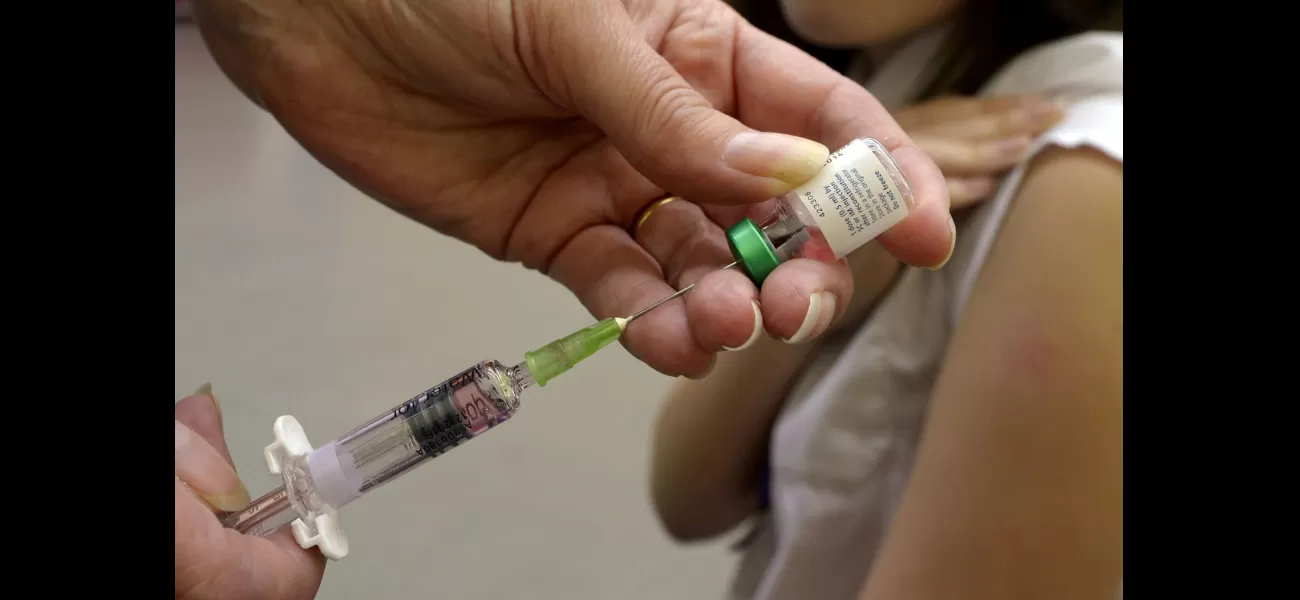Parents warned of significant danger from measles outbreaks affecting many people
National campaign launched due to 'serious concern' about decreasing vaccine rates.
January 22nd 2024.

A new nationwide campaign has been launched in response to the rising number of measles cases across England. Concerned parents and caregivers are being urged to take action by ensuring their children are vaccinated against the highly contagious disease. This call for action comes after a national incident was declared due to the rapid spread of measles.
In the West Midlands alone, there have been a concerning 216 confirmed cases of measles and an additional 103 probable cases since October of last year. What's even more alarming is that the majority of these cases were found in children under the age of ten. Officials are deeply worried about the downward trend in MMR (measles, mumps, and rubella) vaccinations among children, which they consider to be a "serious concern."
To combat this concerning trend, the NHS has launched a campaign targeting all parents with children between the ages of six and eleven. The goal is to encourage these parents to schedule an appointment for any missed vaccines. Additionally, the NHS is also reaching out to more than a million people aged eleven to twenty-five in London and the West Midlands, where MMR uptake rates are particularly low.
Steve Russell, Director of Vaccinations and Screening at the NHS, has warned that one in five children who contract measles will need to be hospitalized for treatment. He stated, "People who are unvaccinated can receive catch-up jabs at pop-up clinics in schools and other convenient locations, while GPs, teachers, and trusted community leaders are also encouraging those who are less likely to get vaccinated to come forward." This effort builds upon the national MMR catch-up campaign that was launched at the beginning of winter, which included text, email, and letter reminders for parents and guardians of children under five who have not yet received full protection.
But what exactly is measles? It is a highly contagious infection that can cause serious health problems in some individuals. Initially, symptoms may include a high fever, runny nose, and cough, but after a few days, a distinctive rash will appear. In some cases, small spots may also develop in the mouth. If the infection spreads to other parts of the body, such as the lungs or brain, it can lead to more severe complications like pneumonia, meningitis, blindness, or seizures. While these serious problems are rare, certain groups, such as babies and people with weakened immune systems, are at a higher risk.
The MMR vaccine, which is considered safe and effective by the NHS, provides 99% protection against measles and rubella after two doses, and 88% protection against mumps. During a recent visit to Birmingham, UKHSA Chief Executive Dame Jenny Harries stated that the World Health Organization recommends a 95% coverage rate for countries. She also expressed concern about the current vaccination rate in the UK, which has dropped to around 85% for children receiving two MMR vaccinations before starting school, falling way below the desired 95% rate.
Typically, the MMR vaccine is given to babies at the age of one, with a second dose administered at three years and four months. However, in some areas, the vaccination rates have dropped as low as 70%, which is far from the safe population coverage of 95%. Dr. Gayatri Amirthalingam, Consultant Medical Epidemiologist at UKHSA, emphasized the importance of routine childhood vaccinations, stating, "The continuing downward trend in uptake is a serious concern. These vaccines protect against diseases like measles, which can have life-changing or even deadly consequences. No parent wants this for their child, especially when these diseases are easily preventable."
In the West Midlands alone, there have been a concerning 216 confirmed cases of measles and an additional 103 probable cases since October of last year. What's even more alarming is that the majority of these cases were found in children under the age of ten. Officials are deeply worried about the downward trend in MMR (measles, mumps, and rubella) vaccinations among children, which they consider to be a "serious concern."
To combat this concerning trend, the NHS has launched a campaign targeting all parents with children between the ages of six and eleven. The goal is to encourage these parents to schedule an appointment for any missed vaccines. Additionally, the NHS is also reaching out to more than a million people aged eleven to twenty-five in London and the West Midlands, where MMR uptake rates are particularly low.
Steve Russell, Director of Vaccinations and Screening at the NHS, has warned that one in five children who contract measles will need to be hospitalized for treatment. He stated, "People who are unvaccinated can receive catch-up jabs at pop-up clinics in schools and other convenient locations, while GPs, teachers, and trusted community leaders are also encouraging those who are less likely to get vaccinated to come forward." This effort builds upon the national MMR catch-up campaign that was launched at the beginning of winter, which included text, email, and letter reminders for parents and guardians of children under five who have not yet received full protection.
But what exactly is measles? It is a highly contagious infection that can cause serious health problems in some individuals. Initially, symptoms may include a high fever, runny nose, and cough, but after a few days, a distinctive rash will appear. In some cases, small spots may also develop in the mouth. If the infection spreads to other parts of the body, such as the lungs or brain, it can lead to more severe complications like pneumonia, meningitis, blindness, or seizures. While these serious problems are rare, certain groups, such as babies and people with weakened immune systems, are at a higher risk.
The MMR vaccine, which is considered safe and effective by the NHS, provides 99% protection against measles and rubella after two doses, and 88% protection against mumps. During a recent visit to Birmingham, UKHSA Chief Executive Dame Jenny Harries stated that the World Health Organization recommends a 95% coverage rate for countries. She also expressed concern about the current vaccination rate in the UK, which has dropped to around 85% for children receiving two MMR vaccinations before starting school, falling way below the desired 95% rate.
Typically, the MMR vaccine is given to babies at the age of one, with a second dose administered at three years and four months. However, in some areas, the vaccination rates have dropped as low as 70%, which is far from the safe population coverage of 95%. Dr. Gayatri Amirthalingam, Consultant Medical Epidemiologist at UKHSA, emphasized the importance of routine childhood vaccinations, stating, "The continuing downward trend in uptake is a serious concern. These vaccines protect against diseases like measles, which can have life-changing or even deadly consequences. No parent wants this for their child, especially when these diseases are easily preventable."
[This article has been trending online recently and has been generated with AI. Your feed is customized.]
[Generative AI is experimental.]
0
0
Submit Comment





